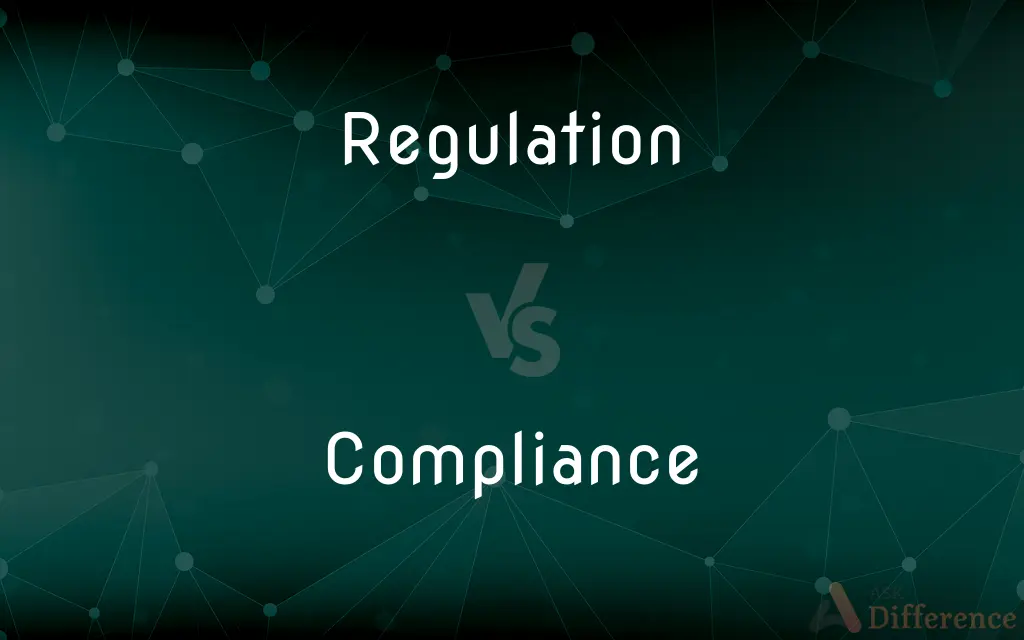Regulation vs. Compliance — What's the Difference?
By Urooj Arif & Maham Liaqat — Updated on April 4, 2024
Regulation involves the establishment of rules by authorities, whereas compliance refers to the act of adhering to those rules.

Difference Between Regulation and Compliance
Table of Contents
ADVERTISEMENT
Key Differences
Regulation is the process of establishing rules, standards, or laws by government or industry authorities to control or govern conduct within specific fields. Compliance, on the other hand, is the action taken by organizations or individuals to ensure that they follow the established rules, standards, or laws.
Regulations are created to protect public interest, ensure fair practices, and maintain safety within industries. These rules can cover a wide range of activities and sectors, including financial services, healthcare, and environmental protection. Compliance signifies the efforts made by businesses and individuals to stay within the legal and ethical boundaries set by these regulations.
The responsibility for creating regulations lies with governmental bodies or regulatory authorities, who draft, enact, and enforce rules to govern specific areas of public and private life. Compliance, conversely, is the responsibility of the entities subject to regulation, requiring them to adjust their operations and policies to meet regulatory standards.
Non-compliance with regulations can lead to legal penalties, fines, and reputational damage, highlighting the importance of compliance programs within organizations. These programs are designed to educate employees, monitor adherence, and report on compliance status to regulatory bodies.
While regulation sets the framework within which entities operate, compliance ensures that these entities act responsibly within that framework. Both play crucial roles in maintaining the integrity, safety, and fairness of various industries and sectors.
ADVERTISEMENT
Comparison Chart
Definition
The establishment of rules by authorities.
The act of adhering to established rules.
Purpose
To govern conduct, ensure safety, and protect public interest.
To follow legal and ethical standards set by regulations.
Responsibility
Governmental bodies and regulatory authorities.
Organizations and individuals subject to regulations.
Outcome
Sets standards and expectations for behavior and operations.
Demonstrates adherence to legal and ethical standards.
Implications
Creates a framework for operations in various sectors.
Prevents legal penalties and promotes ethical practices.
Compare with Definitions
Regulation
Typically enforced by government agencies or regulatory bodies.
The Securities and Exchange Commission oversees the enforcement of financial regulations.
Compliance
The action of conforming to rules or standards.
The company's compliance with the new regulations was audited last quarter.
Regulation
Rules or directives made and maintained by an authority.
The new financial regulations aim to prevent future economic crises.
Compliance
To ensure that organizations operate within legal and ethical boundaries.
Compliance programs are crucial for avoiding legal penalties.
Regulation
To control activities, ensuring safety and fairness within industries.
Environmental regulations are enforced to protect natural resources.
Compliance
Falls on the entities governed by the regulations.
It is the responsibility of each employee to contribute to the company's compliance efforts.
Regulation
Applies to various sectors, including healthcare, finance, and environment.
The healthcare sector is heavily regulated to ensure patient safety.
Compliance
Helps avoid fines, legal penalties, and reputational damage.
Through diligent compliance, the firm maintained its integrity and avoided fines.
Regulation
Affects how organizations operate, influencing their policies and procedures.
New data protection regulations require changes in how companies handle personal information.
Compliance
Includes monitoring, reporting, and educating staff about regulations.
Regular training sessions are part of the company’s compliance strategy.
Regulation
Regulation is the management of complex systems according to a set of rules and trends. In systems theory, these types of rules exist in various fields of biology and society, but the term has slightly different meanings according to context.
Compliance
The action or fact of complying with a wish or command
The ways in which the state maintains order and compliance
Regulation
A rule or directive made and maintained by an authority
Planning regulations
Compliance
The property of a material of undergoing elastic deformation or (of a gas) change in volume when subjected to an applied force. It is equal to the reciprocal of stiffness.
Regulation
The action or process of regulating or being regulated
The regulation of financial markets
Compliance
The act of complying with a wish, request, or demand; acquiescence.
Regulation
The act of regulating or the state of being regulated.
Compliance
(Medicine) Willingness to follow a prescribed course of treatment.
Regulation
A principle, rule, or law designed to control or govern conduct.
Compliance
A disposition or tendency to yield to the will of others.
Regulation
A governmental order having the force of law. Also called executive order.
Compliance
Extension or displacement of a loaded structure per unit load.
Regulation
(Embryology) The capacity of an embryo to continue normal development following injury to or alteration of a structure.
Compliance
Flexibility.
Regulation
(Sports) The standard playing period for a timed game, prior to overtime or a shootout.
Compliance
An act of complying.
Regulation
(uncountable) The act of regulating or the condition of being regulated.
Compliance
(uncountable) The state of being compliant.
Regulation
(countable) A law or administrative rule, issued by an organization, used to guide or prescribe the conduct of members of that organization.
Army regulations state a soldier AWOL over 30 days is a deserter.
Compliance
(uncountable) The tendency of conforming with or agreeing to the wishes of others.
Regulation
A type of law made by the executive branch of government, usually by virtue of a statute made by the legislative branch giving the executive the authority to do so.
Compliance
(mechanics) A measure of the extension or displacement of a loaded structure; its flexibility
Regulation
A numbered provision within such kind of law.
Compliance
(medicine) The accuracy with which a patient follows an agreed treatment plan
Regulation
(European Union law) A form of legislative act which is self-effecting, and requires no further intervention by the Member States to become law.
Compliance
The department of a business that ensures all government regulations are complied with.
Regulation
(genetics) Mechanism controlling DNA transcription.
Compliance
The act of complying; a yielding; as to a desire, demand, or proposal; concession; submission.
What compliances will remove dissension?
Ready compliance with the wishes of his people.
Regulation
(medicine) Physiological process which consists in maintaining homoeostasis.
Compliance
A disposition to yield to others; complaisance.
A man of few words and of great compliance.
Regulation
In conformity with applicable rules and regulations.
Compliance
Acting according to certain accepted standards
Regulation
The act of regulating, or the state of being regulated.
The temper and regulation of our own minds.
Compliance
Happy friendly agreement
Regulation
A rule or order prescribed for management or government; prescription; a regulating principle; a governing direction; precept; law; as, the regulations of a society or a school.
Compliance
A disposition or tendency to yield to the will of others
Regulation
An authoritative rule
Compliance
The act of submitting; usually surrendering power to another
Regulation
A principle or condition that customarily governs behavior;
It was his rule to take a walk before breakfast
Short haircuts were the regulation
Regulation
The state of being controlled or governed
Regulation
(embryology) the ability of an early embryo to continue normal development after its structure has been somehow damaged or altered
Regulation
The act of bringing to uniformity; making regular
Regulation
The act of controlling or directing according to rule;
Fiscal regulations are in the hands of politicians
Regulation
Prescribed by or according to regulation;
Regulation army equipment
Common Curiosities
Why is compliance important?
Compliance is crucial for avoiding legal penalties, maintaining operational licenses, and preserving reputation.
Can regulations change?
Yes, regulations can and do change in response to new developments, requiring entities to adjust their compliance efforts.
Can an individual be responsible for compliance?
Yes, individuals can be responsible for compliance in their professional roles, particularly in positions of management or oversight.
What happens if a company fails to comply?
Non-compliance can result in penalties, fines, legal action, and damage to reputation.
Are all industries regulated the same way?
No, regulations vary significantly across industries, reflecting the unique risks and considerations of each sector.
Who creates regulations?
Regulations are created by government bodies, regulatory authorities, or industry groups.
Can a small business be exempt from certain regulations?
Some regulations may have exemptions based on size, revenue, or industry, but most businesses are subject to some form of regulation.
What is the difference between regulation and compliance?
Regulation refers to the establishment of rules by authorities, while compliance is about following those rules.
How do regulatory changes impact businesses?
Businesses may need to adjust their operations, policies, and compliance programs in response to regulatory changes.
What tools help with compliance?
Tools for compliance include software for monitoring and reporting, training programs, and consultancy services.
How do organizations ensure compliance?
Organizations ensure compliance through programs that include training, monitoring, and reporting mechanisms.
What role do compliance officers play?
Compliance officers oversee the development and implementation of compliance programs and ensure organizational adherence to regulations.
What is the relationship between corporate governance and compliance?
Corporate governance involves the systems by which companies are directed and controlled, while compliance ensures these systems adhere to legal and regulatory standards.
Is compliance only a legal requirement?
While often legally required, compliance also supports ethical standards and best practices within industries.
How does international business affect compliance?
International businesses must comply with regulations in all jurisdictions they operate in, which can complicate compliance efforts.
Share Your Discovery

Previous Comparison
Threatening vs. Blackmail
Next Comparison
Corridor vs. LobbyAuthor Spotlight
Written by
Urooj ArifUrooj is a skilled content writer at Ask Difference, known for her exceptional ability to simplify complex topics into engaging and informative content. With a passion for research and a flair for clear, concise writing, she consistently delivers articles that resonate with our diverse audience.
Co-written by
Maham Liaqat















































